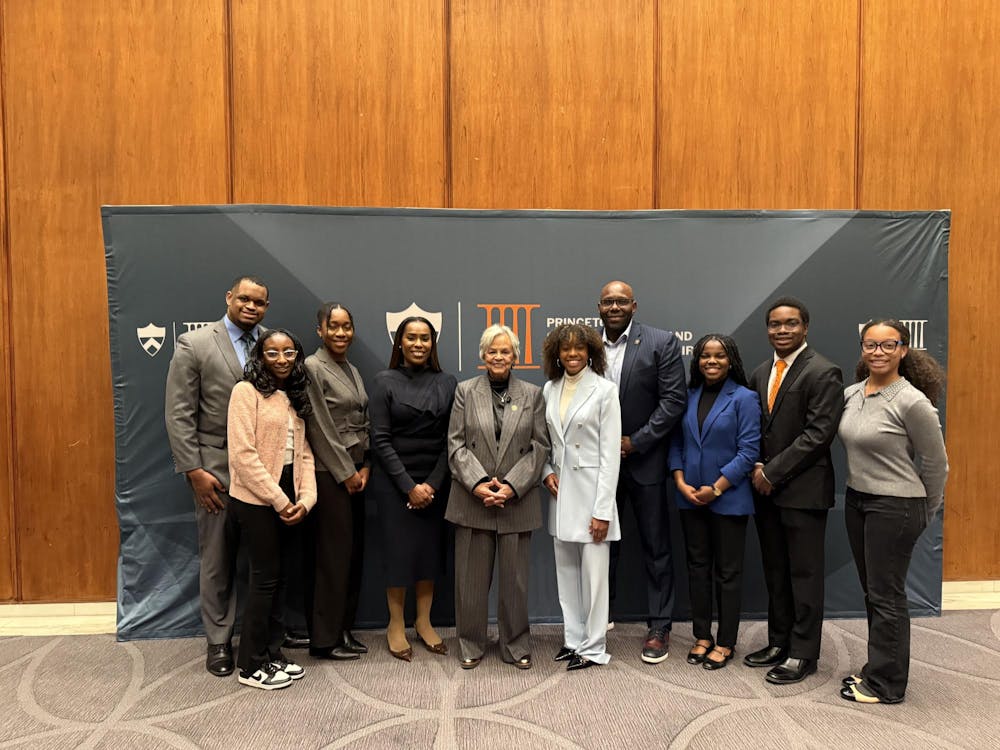Fifteen years after completing a successful career at Princeton deejaying at the 'Street' in the all-female group "Trice as Nice," Lauren Robinson-Brown '85 has returned to campus to spin another tune.
The University tapped Robinson-Brown for the position of communications director in June after former chief spokesperson Justin Harmon '78 left to take a job at Wesleyan University.
"It wasn't a hard decision for me," Robinson-Brown said about returning to Princeton. "Once you're a part of the Princeton family, you always want to come back."
Robinson-Brown brings to the communications office experience both as a journalist and press director.
Most recently, she served as assistant New Jersey secretary of state, the second-ranking position in the department. She started at the state department as director of communications in December 1994.
"When the assistant secretary of state stepped down, Lauren was the unanimous choice to succeed her," said Mike Kinney, who succeeded Robinson-Brown as communications director at the state department.
In addition to her day-to-day duties managing the department — which today has more than 200 employees — Robinson-Brown spent a considerable amount of time on special projects, Kinney said.
"Back in 1998, the government started to encourage personal responsibility, especially for young people to take responsibility," Kinney explained. Robinson-Brown was heavily involved in this initiative, helping to create the Center for Youth Policy and Programs.

"[The center] was important for me because young people are often ignored," Robinson-Brown said, noting that the center provided the first "one-stop shop" in the state government for general youth concerns. "This is one of the things I'm very proud of," she said.
Before her tenure at the state department, Robinson-Brown was executive director and press secretary for the Boston school system in 1993. But her time at the Boston schools was short — less than a year — and trying.
"At the time we were employed by the [Boston schools] committee, it was one of the most difficult times," said Ofelia Pedraza, who worked directly under Robinson-Brown.
Pedraza said she and Robinson-Brown had to deal with difficult administrative reforms and educational issues, including a five-month contract negotiation with the Boston Teachers Union that almost resulted in a teacher strike.

"Lauren and I were basically here running community meetings, doing everything we needed to do in order not to compromise the administration during the changes," Pedraza said. "It was a crucial time and the workload was heavy. We were here sometimes on Friday nights until one or two in the morning."
Journalism background
After Princeton, however, Robinson-Brown did not start her career in the communications arena, but in journalism. From 1985 to 1993, she worked as a freelance writer and for The Star-Ledger in Newark, The Dallas Times-Herald and The Boston Globe.
Though the experience as a journalist was challenging and rewarding, Robinson-Brown said it did not allow her to effect change in the community.
"As a journalist, you're always an observer," she explained. That position was a difficult one for Robinson-Brown, who said she prefers hands-on involvement.
At Princeton, where she was an English major and participated in the creative writing and African-American studies programs, Robinson-Brown was very involved in racial issues.
"At the time Princeton Inn, where I lived, was half black and half white. There were a lot of race issues in the air. During meal time, the dining hall was very segregated," said Robinson-Brown, who is African-American.
Community dialogue sparked by this segregation helped create the residential college system and the conversion of Princeton Inn into Forbes College, Robinson-Brown said.
Returning this summer to Princeton, Robinson-Brown said she has noticed an improvement in race relations on campus.
"I think race relations are better today because of all the talk about it," she said. "I know there is a concerted effort in terms of building diversity in faculty and staff, and that these efforts are becoming fruitful."
"There weren't a lot of minority faculty back then. That was a big fear," Robinson-Brown explained. "Now there's been time to adjust to these issues."







